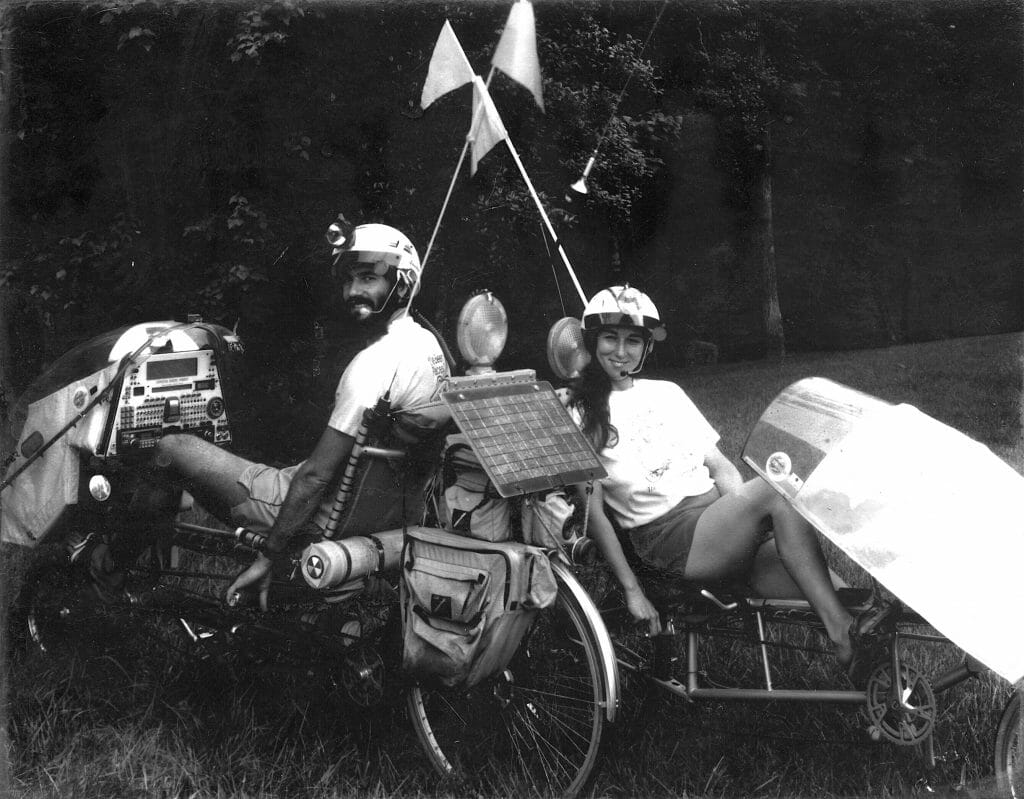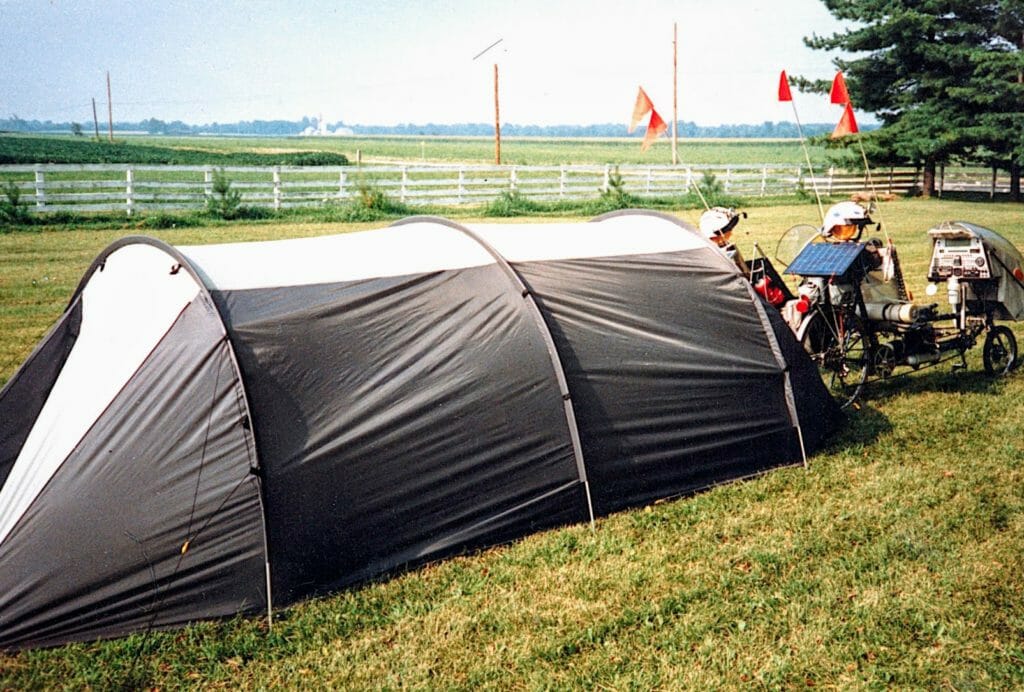
Menage a Trois
first published as “The Other Woman”
©1987 Steven K. Roberts
Ithaca, NY (13,231 miles)
August 21, 1987
The road, once begun, never stops. Tonight in Ithaca, over a fine dinner of linguine and wine, coffee and sorbet, we spoke of travel. Hitchhiking marathons of 17 years ago were revived in candlelight; freight-hopping adventures came to life with all the gritty romance of swaying cars and rusty steel. Bright-eyed and wine-lubed, we recounted nights alone in Nebraska, Jersey cops, long-haul truckers, perverts, road romances, the delicious filth of coal cars across the great prairies, the strange improbable madness of travel… those moments that linger rich in the memory like first loves and last good-byes.
I’m not sure what started my addiction — how I graduated from small doses of bush-league adventure to the hard stuff. I do know that the type of movement doesn’t matter very much. The megabike is appropriate and endlessly entertaining, but it’s not the heart of my wanderings. The heart is a wild throbbing thing of thermos coffee, road maps, strange eyes, and exploratory kisses — of faded packs and mountains, harbor smells and camp stoves.
No, I have no idea how it all started, but I do know I’m a victim — a happy victim, more willing to pedal over hills on a 95-degree summer afternoon than endure an air-conditioned office at $50,000 a year. The road, the Other Woman, is the love of my life… and I’ll kiss her sweet asphalt forever if she’ll keep me free from the torpor of stability.
She’s a tough one, though. This is never an easy relationship. The Other Woman seduces the unwary and has thousands of lovers… yet is jealous of every one. She’ll kill you with your own passion or ignore you in some backwater until you scream in frustration. She’ll fill you with delicious fantasies then spill your blood without remorse. But still you can never leave her — only withdraw for a while to lick your wounds and sample someone stable, secretly browsing your Rand-McNally in the bathroom like a worn copy of Penthouse while dreaming of your next escape. The Other Woman lures you back, time after time, lures you back into her long winding arms like the helplessly lovestruck suitor you are. For once you taste her charms, you are forever spoiled, forever ruined — doomed to fidget through your static spells and gaze misty-eyed at old boots, stir at the sound of pre-dawn freights, pick up hitchhikers in tight-chested jealousy and try not to show your pain.
Yeah… if you don’t go running back, you suffer forever.
We’re a sort of family, spread across the planet like a scattered clan with a rare genetic disorder, drawn together in common need, recognizing each other in crowds. We are the victims of the Other Woman. We gather around campfires, trade food, grin across the highway with weathered faces crinkled and arms upraised. In hostels, our strange accents tickle each other’s ears; we trot out our memories and photos to share insights into what makes the Road the irresistible Siren she is. We can spot each other at a distance, and even sense the stirrings of puppy love that doom the occasional child to a life of wandering — the child who stands on an invisible leash at town-edge, holding his bicycle, biting his lip as we roll past him toward the mysteries of the open road. We wink, knowing the moment has been branded onto the surface of that young brain, searing the delicate cortical tissues into a permanent overlay that will subtly alter everything he sees, forever. A future brother…
It’s not all men, of course, despite those personal pronouns. Women are struck too: just as addicted, just as seriously ruined by the Road for anything even approaching long-term stability. The Other Woman is quite happily bi, luring beauty into her lair, terrifying parents, turning career women into healthy backpack-toting hostelers who push past their road-fear into a life of adventure. They’re rare, radiant females, glowing with the flush of urges fulfilled and moving with the free grace of animals… not the stylized grace of fashion.
But as infinite as the Other Woman is, there are certain things she can’t do very well — things that leave one fleeing her arms for those of flesh… then returning again and again, running to and fro in confusion like a child caught in a divorce. For years I traveled like that, pedaling from romance to romance against a backdrop of the road. It became a sort of rhythm, a soft succession of new loves, a Russian roulette of pathogens. I would pedal into town and meet her. You know, HER. Eyes would lock. Hands would tremble. She would be drawn into my writing, my bike, the adventure of my life. I would be drawn into her beauty, her warmth, her modular phone jack. Needing a place to stay and sensing the stirrings of passion, I would move in.
By unspoken agreement, the bike would become a piece of abstract sculpture standing in her living room instead of an ominous poised symbol of my transience. The love would grow, fragile, accelerated by circumstance, a whole relationship compressed into days. But then the Other Woman would begin whispering from the dark, and I’d start gathering the zip-locs, tweaking the bike, scanning my list of contacts. I’d break the news, and try in vain to soften the pain… my chest aching at the tears of sorrow and reproach glistening like jewels on the cheeks of a new friend. Promises… to write, to rendezvous, to remember. And then the last kiss, so terribly different from the first.
Alone, I’d slap on the headphones and crank up the jazz, reset the Cat-Eye and flee back to the Other Woman, that bitch, the rhythm of my pedals salting the open wound of young love shattered again. It got old after a while, the novelty obscured by the pain.
And so we come to the present. I’m rolling around in a ménage à trois now: Maggie, the Road, and I. This might be it — a blend of comfort and adventure, flesh and asphalt, love and addiction, freedom and security. The endless changes of travel keep the moss off our toes, yet we suffer not from road-ache, that affliction that renders the lone traveler somehow tragic and driven, a free electron looking for a covalent bond. We’ve become a molecule, Maggie and I, drifting together from family to family, more a part of the solution than of the precipitate. It’s a good life, and I’m even learning to handle the once-terrifying stability of a long-term love.
We share road food, conjured from her bicycle trailer by magic. We zip our down bags together to chase the evening chill — our porta-condo a cocoon of healthy smells as the familiar fabric walls billow gently in the breezes of a new place. The rhythms of movement beat like an undercurrent of congas in the night: heart thumping, pedal pumping, file dumping. New towns roll into view, effortlessly, each a haven of new friends and warm beds… each a different view of the same essential home. I write, add bike systems, and expand the family. And it’s so easy, this nomadic life, now that the desperation is gone and the tools are familiar.
The Other Woman wasn’t expecting this domestication, but she doesn’t seem to mind. She still throws us curves, owns our hearts, and leaves us panting… hungry for more.
That’s the way she likes it.
There are pages describing the three versions of the bike, which covered 17,000 miles. A chapter 3 years earlier approached this topic from a different perspective, and there is a corresponding Facebook page here:




You must be logged in to post a comment.